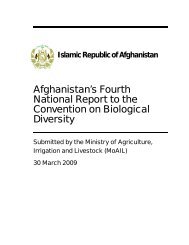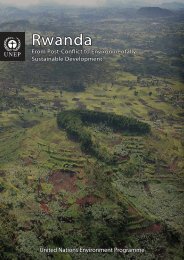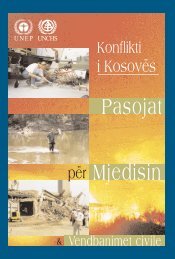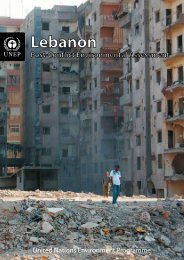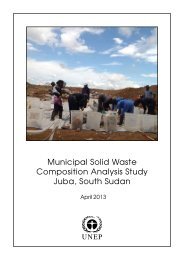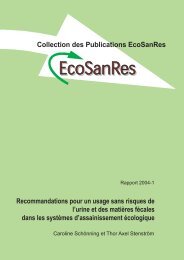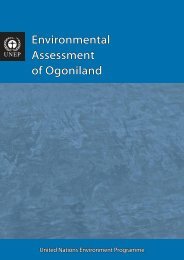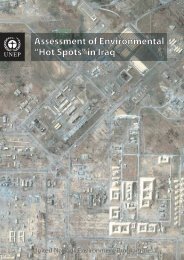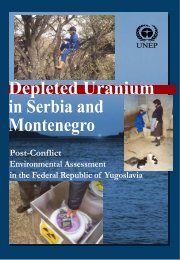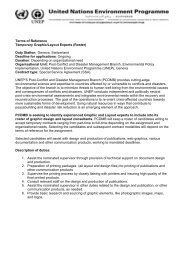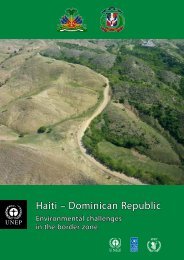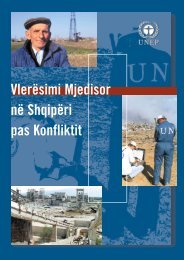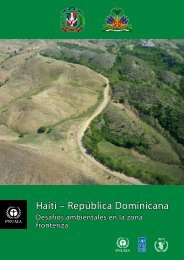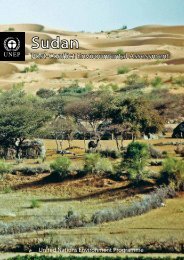Strengthening capacity - Disasters and Conflicts - UNEP
Strengthening capacity - Disasters and Conflicts - UNEP
Strengthening capacity - Disasters and Conflicts - UNEP
Create successful ePaper yourself
Turn your PDF publications into a flip-book with our unique Google optimized e-Paper software.
7<br />
STRENGTHENING<br />
CAPACITY TO<br />
MANAGE DISPUTES OVER EXTRACTIVE<br />
RESOURCES<br />
Challenges<br />
As described in the Guidance Note on ‘Extractive<br />
Industries <strong>and</strong> Conflict’, there are eight basic<br />
challenges associated with extractive industries:<br />
poor engagement of communities <strong>and</strong> stakeholders;<br />
inequitable benefit-sharing <strong>and</strong> distribution; social<br />
<strong>and</strong> environmental impacts; relationships between<br />
communities <strong>and</strong> security forces; economic<br />
impacts; revenue management <strong>and</strong> corruption;<br />
financing war; <strong>and</strong> the quality of the institutional<br />
<strong>and</strong> legal framework.<br />
These basic challenges are amplified under<br />
conditions of violent conflict when concessions<br />
may be granted under duress or when it becomes<br />
possible to make sizable personal gains through<br />
extracting resources illegally, especially if some of<br />
the proceeds are used to fund parties to the conflict<br />
(e.g. conflict diamonds). When a violent conflict<br />
ends, other problems arise, such as the tendency<br />
for communities to exaggerate the wealth that will<br />
be created in the post-conflict era. The potential<br />
for conflict recurrence may be closely linked to<br />
what transpires in this sector, <strong>and</strong> tensions can<br />
arise quickly amongst communities, investors <strong>and</strong><br />
government agencies - erupting in riots, violent<br />
clashes, human rights abuses, strikes <strong>and</strong> other<br />
threatening <strong>and</strong> criminal acts.<br />
At the same time, the extractive industries offer<br />
a remarkable opportunity to create jobs, attract<br />
foreign investment, generate revenues for the<br />
state <strong>and</strong> local communities, <strong>and</strong> to cultivate trust<br />
through processes that are participatory, transparent<br />
<strong>and</strong> accountable. The challenge for the extractive<br />
industries is to generate revenue for development<br />
while sharing the benefits <strong>and</strong> burdens of resource<br />
extraction transparently <strong>and</strong> broadly.<br />
EU <strong>and</strong> UN can help government <strong>and</strong><br />
civil society to:<br />
7.1 Underst<strong>and</strong> the resource<br />
extraction <strong>and</strong> conflict context<br />
Support a conflict analysis: Identify <strong>and</strong> involve<br />
local institutions, civil society groups <strong>and</strong><br />
regional groupings with local name recognition<br />
<strong>and</strong> legitimacy in the analytical process:<br />
o<br />
o<br />
o<br />
Actors: Which agencies, companies,<br />
security forces, <strong>and</strong> communities have been<br />
involved in prior conflicts over extractive<br />
activities Are there multiple institutions<br />
or actors who claim to be the proper<br />
interlocutor between extracting companies<br />
<strong>and</strong> local communities<br />
Conflict drivers: What are the conflict<br />
dynamics around these resources Are there<br />
disputes about revenues, control of l<strong>and</strong>,<br />
consultation <strong>and</strong> involvement, negative<br />
environmental impacts, failed compensation<br />
schemes Are there community concerns<br />
about current exploration or other earlystage<br />
developments<br />
Institutions: How do differing government<br />
m<strong>and</strong>ates affect the government’s coherence<br />
in the sector Is it possible to identify<br />
attitudes of confidence or mistrust by key<br />
actors in the conflict towards government<br />
institutions, existing concessionaires, <strong>and</strong><br />
public/private security forces<br />
Support the analysis with baseline<br />
information: Create an inventory of mineral<br />
STRENGTHENING CAPACITY FOR CONFLICT-<br />
SENSITIVE NATURAL RESOURCE MANAGEMENT 29




